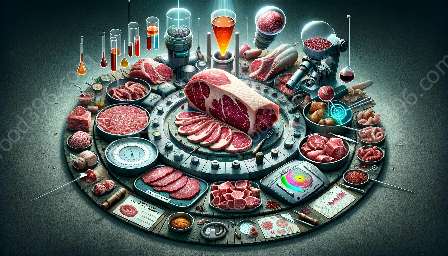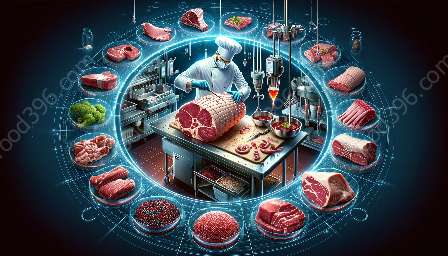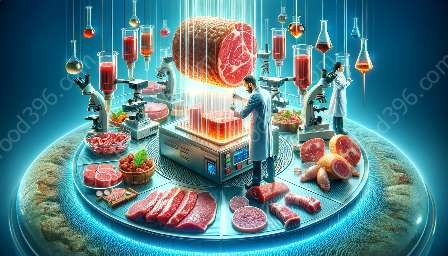Meat authentication and traceability have become increasingly important in the food industry, ensuring the safety, quality, and authenticity of meat products. In this topic cluster, we will explore the fascinating world of meat authentication and traceability, delving into the innovative techniques and technologies that are revolutionizing the field of meat science. From DNA analysis to blockchain technology, we will uncover the latest advancements in ensuring the integrity of meat products from farm to fork.
The Importance of Meat Authentication and Traceability
Meat authentication and traceability are crucial components of ensuring food safety and quality. With growing concerns about food fraud and adulteration, consumers, regulatory bodies, and industry stakeholders are placing greater emphasis on verifying the origins and characteristics of meat products. In response, the meat industry has been adopting advanced technologies and methods to authenticate and trace meat throughout the supply chain. These efforts not only bolster consumer confidence but also help in addressing issues such as foodborne illnesses and regulatory compliance.
Innovative Techniques in Meat Authentication
Advancements in technology have paved the way for groundbreaking techniques in meat authentication. DNA analysis, for example, has revolutionized the ability to verify the species of meat, detect adulteration, and ensure the accuracy of labeling. By using genetic markers and sequencing, scientists can reliably identify the animal species present in meat products, offering a powerful tool for combating food fraud and mislabeling.
Additionally, spectroscopy techniques such as near-infrared spectroscopy (NIR) and Raman spectroscopy are being leveraged for rapid and non-destructive analysis of meat composition. These analytical methods enable the identification of key chemical components in meat, aiding in verifying its quality, freshness, and safety. Moreover, advancements in sensor technologies are facilitating real-time monitoring of meat products, allowing for timely interventions to maintain product integrity.
Technological Innovations in Traceability
Traceability is another vital aspect of ensuring the integrity of meat products. Emerging technologies like blockchain have gained attention for their potential to enhance transparency and traceability in the food supply chain. By leveraging blockchain systems, stakeholders can securely record and track the entire journey of meat products, from farm to processing facilities to retail shelves. This not only provides consumers with detailed information about the origins and handling of meat but also enables swift and accurate recalls in cases of contamination or food safety incidents.
Furthermore, the integration of Internet of Things (IoT) devices and RFID (radio-frequency identification) tags in meat packaging has enabled real-time monitoring of temperature, humidity, and other environmental factors. This level of environmental monitoring is crucial for maintaining the quality and safety of meat products, especially during transportation and storage. By leveraging IoT and RFID technologies, stakeholders can ensure that meat products are handled in accordance with optimal storage conditions, reducing the risk of spoilage and contamination.
Implications for the Food & Drink Industry
The developments in meat authentication and traceability have far-reaching implications for the food and drink industry. With consumers becoming more conscientious about the origin and quality of the products they consume, the ability to provide transparent and trustworthy information about meat products is paramount. By embracing advanced authentication and traceability technologies, food and drink companies can build consumer trust, differentiate their products in the market, and safeguard their brands from the repercussions of food fraud scandals.
Regulatory Landscape and Compliance
Regulatory bodies, including the Food and Drug Administration (FDA) and the European Food Safety Authority (EFSA), are increasingly emphasizing the implementation of robust traceability and authentication measures. Compliance with stringent regulations and standards is essential for meat producers, processors, and retailers to ensure adherence to food safety laws and mitigate risks associated with non-compliance.
Consumer Confidence and Ethical Consumption
Meat authentication and traceability also play a pivotal role in promoting ethical consumption and responsible sourcing. By providing consumers with detailed insights into the provenance of meat, including information about animal welfare, sustainability practices, and farming methods, food and drink companies can appeal to conscientious consumers who prioritize ethical considerations in their purchasing decisions.
Market Differentiation and Brand Integrity
For food and drink companies, investing in meat authentication and traceability technologies offers a competitive advantage in the market. By showcasing a commitment to transparency, quality, and safety through comprehensive traceability systems, companies can differentiate their products and strengthen brand integrity. This can be particularly influential in capturing the preference of discerning consumers who seek assurance in the authenticity and reliability of meat products.
Conclusion
The world of meat authentication and traceability is undergoing a transformative evolution, driven by innovative technologies and a collective commitment to ensuring the safety and integrity of meat products. As we continue to witness advancements in meat science and technological innovation, the food and drink industry stands at the forefront of a paradigm shift towards greater transparency, trust, and accountability. By embracing these developments, stakeholders can not only meet the evolving demands of consumers but also fortify the foundations of a sustainable and responsible food supply chain.



















